The estimated reading time for this entire article is 8 to 10 minutes.
✅ Purpose
This article is written for:
✔ Those who have elderly family members
✔ Those involved in caregiving, medical care, or raising children
✔ Those who want to live their later years with less burden
In Japan’s super-aging society, even something as simple as putting on shoes is a growing challenge for all generations.
Through introducing “LAQUN,” a sneaker you can wear in 1 second without using your hands,
this article shares how reducing assistance and ensuring safety and comfort can coexist.
When putting on shoes becomes a task you no longer have to think about,
it might quietly ease more mental burdens than you realize.
🟩 Introduction
Putting on shoes.
It’s such a small action — but depending on age or health, it can become more of a burden than you’d imagine.
Bending down is hard.
You lose your balance.
Not being able to do it yourself leaves you feeling a little down…
And for caregivers and healthcare workers, this isn’t a small issue either.
In hospitals and facilities where dozens of people need support,
helping patients take shoes on and off becomes heavy, repetitive labor.
But what if there were shoes designed to quietly lighten this burden?
That’s exactly what “LAQUN,” a 1-second, hands-free sneaker offers.
When I discovered this shoe, I realized:
“This isn’t just a sneaker. It’s thoughtful design that makes life a little easier.”
🟦 Chapter 1: Why Is “Putting on Shoes” Such a Burden?
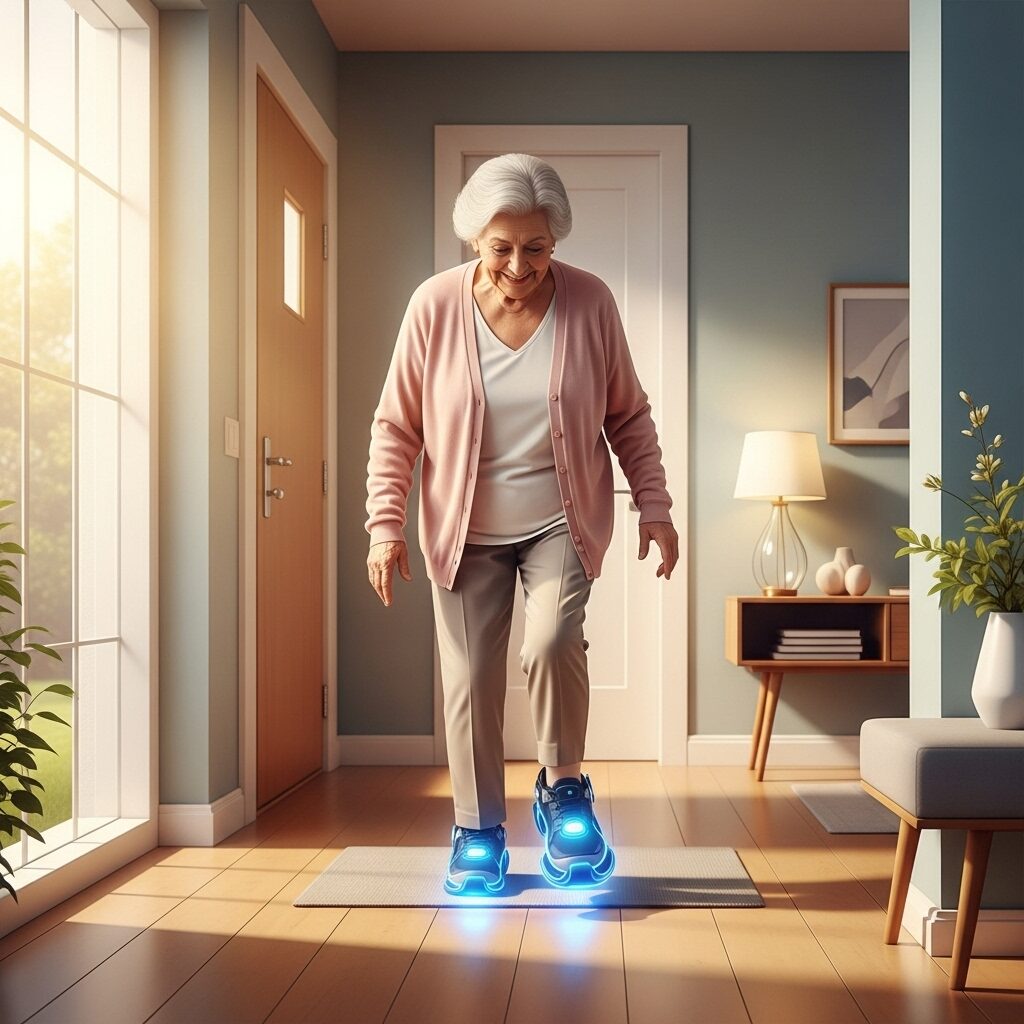
Putting on shoes —
It’s something you don’t even think about when you’re healthy.
But with age or illness,
this simple act suddenly becomes exhausting.
Especially as we grow older:
- Bending forward feels unsafe
- Balancing on one foot becomes tricky
- Back or knee pain makes crouching hard
And gradually, the things you used to do on your own start slipping away.
Even small actions like wearing shoes can reflect this change.
Babies grow by learning what they couldn’t do before.
But aging walks the opposite path — a truth that quietly steals confidence.
And this isn’t just about the elderly.
It’s about those who help them too:
caregivers, nurses, childcare workers, and family.
In caregiving and medical settings, helping with shoes happens dozens of times a day.
I’ve heard from people in these fields:
“Taking shoes on and off is surprisingly exhausting.”
Even a few seconds add up to serious strain when repeated for many people.
These “unnoticed burdens” quietly wear down both body and mind.
That’s why—
Having shoes that ease this burden can make daily care and movement much easier.
And more importantly, it allows people to regain a small but precious sense of independence.
🟦 Chapter 2: LAQUN’s Gentle Innovation — “1 Second of Kindness”
I’ve tried so-called “hands-free shoes” before.
Cheap, around $40, and yes, somewhat convenient — but the heel wore out fast and felt stiff.
So honestly, my first thought when I saw LAQUN was:
“It’s expensive…”
But the more I looked into it,
I realized this wasn’t just about price — it was about design and intention.
● LAQUN’s Thoughtful Structure
What makes this shoe special is its structure, allowing you to wear it in 1 second, no hands needed.
✅ Unique heel construction: step in and it naturally opens, then closes back. No shoehorn, no hands.
✅ Special spring tech keeps the heel shape while offering soft support.
✅ Smooth on/off, yet solid hold when walking.
This isn’t just about saving time.
For people who can’t easily crouch or use their hands, it’s meaningful support.
● Built to Last, Unlike Cheap Alternatives
What sets LAQUN apart from cheaper models is its durability and comfort.
It was developed with feedback from medical and care professionals.
Shoes that wear out easily won’t survive these settings.
Here’s what goes into LAQUN:
- Upper: reinforced nylon mesh (durability & breathability)
- Heel: TPU counter (maintains shape)
- Sole: lightweight EVA + durable rubber (cushioning & grip)
- Insole: antibacterial, odor-resistant, arch support cushion
- Opening: soft padding to reduce stress during wear
Just by looking, you can tell it’s built to withstand daily, repeated use.
● It’s an Investment, but the Quality Speaks
Yes, LAQUN costs more than regular sneakers.
But for those who put shoes on and off multiple times a day, it’s part of life’s toolkit.
Durable, easy, kind to both wearer and helper.
In that sense, I see its value beyond the price tag.
🟦 Chapter 3: Voices from Care, Medicine, and Parenting
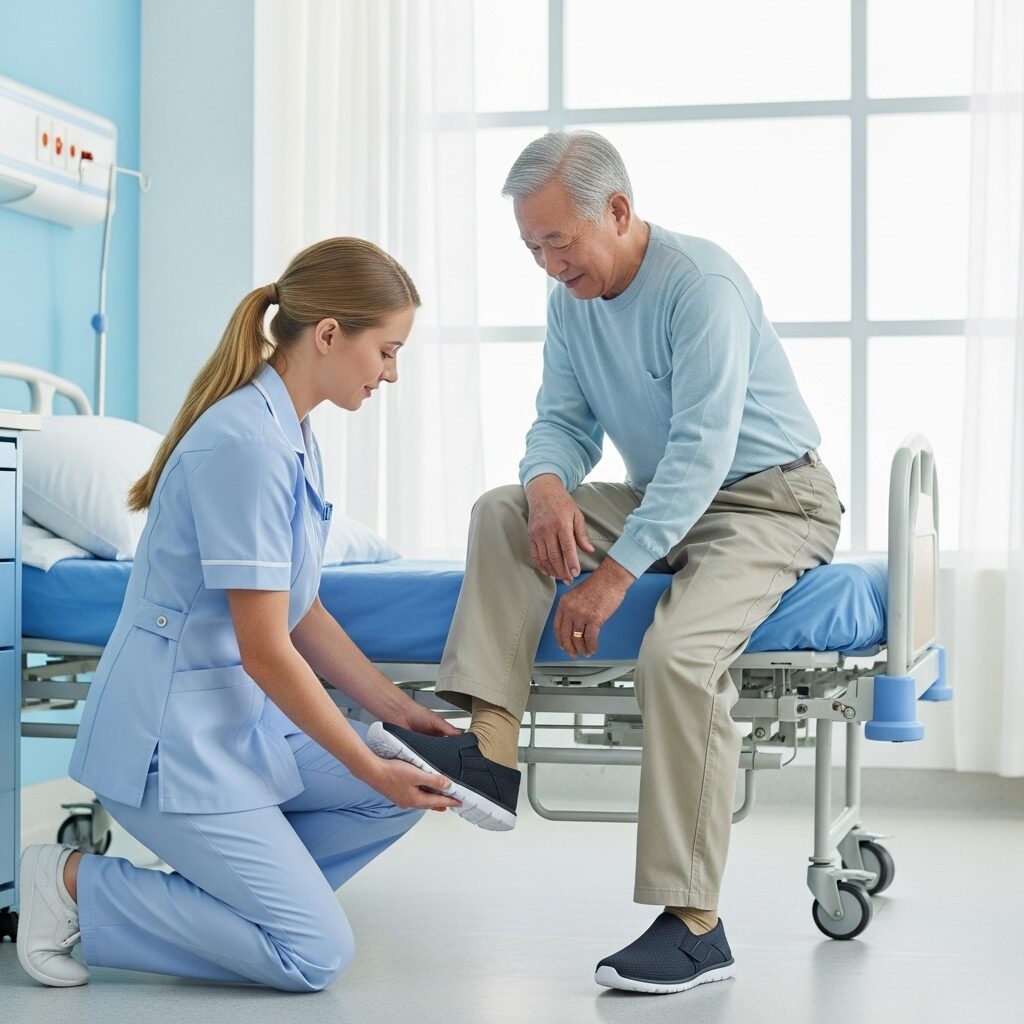
“It’s so exhausting helping elderly patients take their shoes on and off.”
That’s a common voice from medical and caregiving settings.
Exam rooms, treatment areas — shoes come on and off often.
It’s hard for patients and surprisingly tiring for staff.
In places where many elderly live, this repetition adds up.
Each act may be “small,” but together, they cause back pain, wrist strain, even staffing issues.
Healthcare workers themselves also change shoes entering ORs or treatment rooms, often carrying them around.
Parents, too, face similar struggles.
With a baby in arms, even wearing your own shoes is tough.
In these everyday moments, being able to slip on shoes hands-free brings small but meaningful relief.
So it’s not just the elderly who face shoe burdens —
it’s everyone involved in care, medicine, and parenting.
If that burden could be lightened in just 1 second, hands-free —
LAQUN is a shoe designed with these realities in mind.
🟦 Chapter 4: Why This “Kind Design” Resonates in My 50s
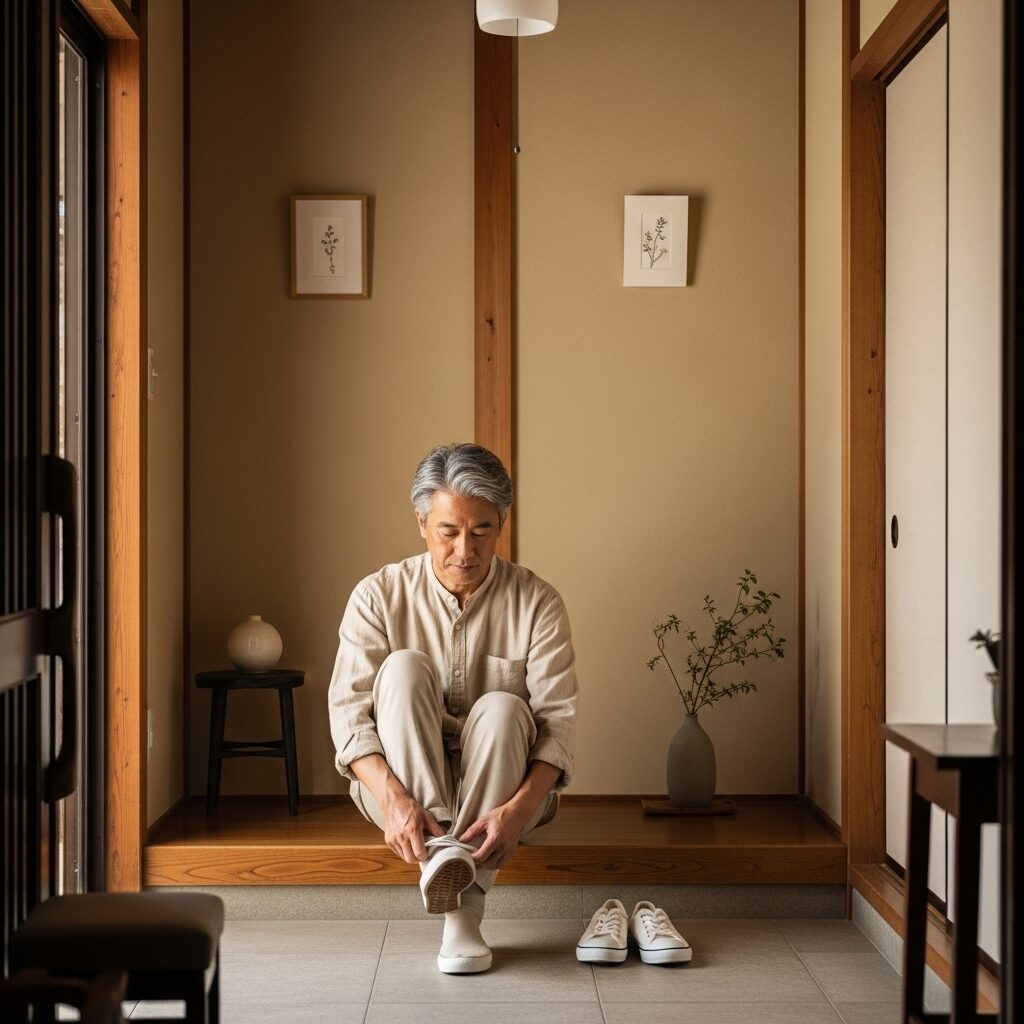
To be honest, I haven’t tried LAQUN myself yet.
But now in my 50s, it caught my attention.
Lately, back pain is more common.
And I know these aches will only increase with time.
Sadly, I also know there’ll be more things I “can’t” do in future.
Kids grow by gaining abilities.
We grow older by losing them.
That’s why—
The idea of just slipping your foot in to wear shoes feels less like laziness and more like future kindness to myself.
Yes, the price matters.
But if this shoe isn’t just for me, but helps lighten the load on others too—
Then it’s not just “equipment.”
It’s thoughtful design, worth valuing.
For a future version of me, or someone dear,
a shoe like LAQUN could help them feel, “I can still do this myself.”
That’s why I want to remember it as an option.
🟦 Chapter 5: In Conclusion — From Our Feet, A Kinder Japan
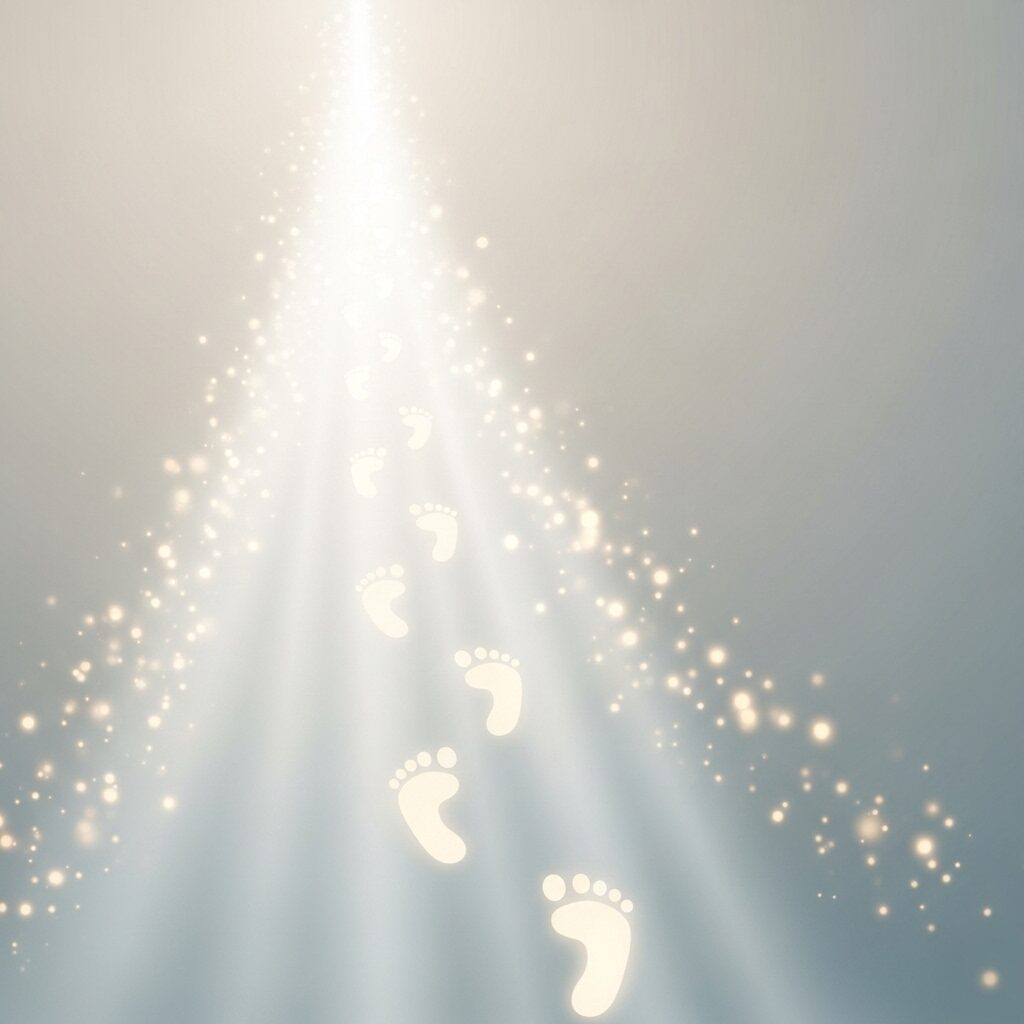
Japan will continue aging rapidly.
Everyone will either give or receive care someday.
In this context, even putting on shoes becomes a serious issue.
Preserving small abilities in the face of aging builds confidence and ease.
And these little acts support daily life.
In caregiving.
In medical fields.
In homes raising children.
Protecting someone’s independence is an act of kindness.
These small efforts gently steer society toward compassion.
What Japan needs now is this kind of “thoughtful functionality.”
And maybe shoes like LAQUN are part of that first step.
Small tools can quietly reshape the world.
That’s not some grand thing.
I simply believe,
kind, considerate products will matter more and more in Japan’s future.
✅ If you’re interested, here are some more stories from this blog.
🔗 Swimming, Healing, and Finding New Strength — My 50s Pool Habit
https://freelife50.com/title-my-back-hurt-so-i-couldnt-run-anymore-but-i-could-still-swim-a-gentle-restart-in-my-50s/
Even if running became too painful, swimming helped me heal — a little story about facing changes in my 50s body.
🔗 The Joy of Brushing Teeth Again — A Little Luxury for Everyday Life
https://freelife50.com/🪥a-black-swiss-beauty-in-your-bathroom-when-a-toothbrush-feels-like-a-rolex/
How a simple tool can lift your mood — a small but joyful habit in my 50s.
🔗 If Smart Rings Could Care — 6 Features We Quietly Wish For
https://freelife50.com/if-smart-rings-could-care-6-future-features-we-quietly-wish-for/
A small wish for the future — gentle tools that might help us live a little more peacefully.
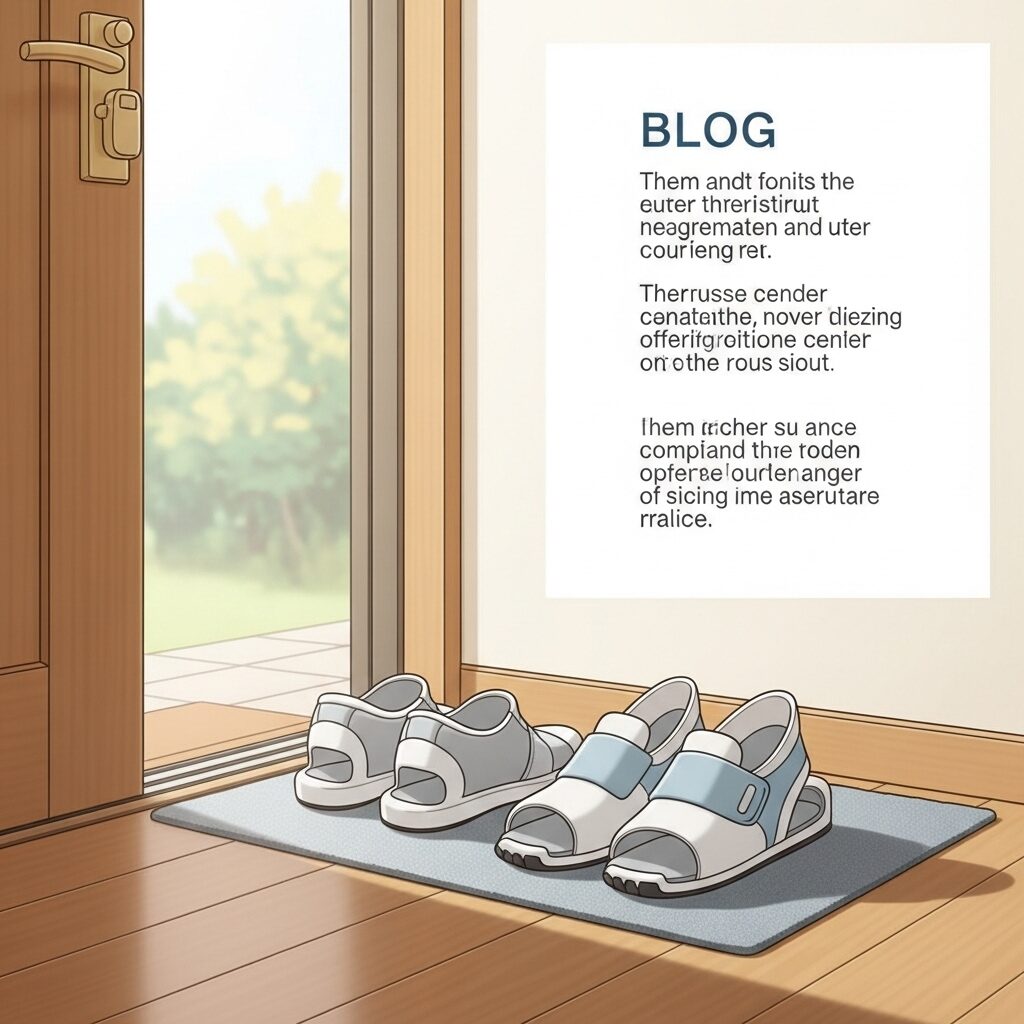


コメント